Gordon Brown Resigns, David Cameron Becomes Prime Minister
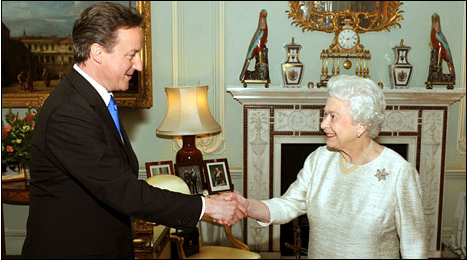 As seemed inevitable when James wrote his post, David Cameron has become the new Prime Minister of Great Britain.
As seemed inevitable when James wrote his post, David Cameron has become the new Prime Minister of Great Britain.
BBC:
Conservative leader David Cameron is the new UK prime minister after the resignation of Gordon Brown.
Mr Cameron, 43, is in Downing Street after travelling to Buckingham Palace to formally accept the Queen’s request to form the next government.
He said he aimed to form a “proper and full coalition” with the Lib Dems to provide “strong, stable government”.
His party won the most seats in the UK general election last week, but not an overall majority.
In a speech at Downing Street, Mr Cameron said he and Lib Dem leader Nick Clegg would “put aside party differences and work hard for the common good and the national interest”.
He paid tribute to outgoing PM Gordon Brown for his long years of public service and said he would tackle Britain’s “pressing problems” – the deficit, social problems and reforming the political system.
Mr Cameron stressed there would be “difficult decisions” but said he wanted to take people through them to reach “better times ahead”.
The Conservatives have been in days of negotiations with the Lib Dems – who were also negotiating with Labour – after the UK election resulted in a hung parliament.
But the Lib Dems said talks with Labour failed because “the Labour Party never took seriously the prospects of forming a progressive, reforming government”.
The deal with the Lib Dems apparently still have to receive final approval from Lib Dem leadership, but that seems to be a mere formality at this point, the deal is done.
Already, though, there are grumblings of discontent in some Tory circles:
The worst thing about this whole process, other than the wholesale abandonment of principle by Cameron, has been the political inadequacy it reveals. Had he simply, when the results were known, said that he would not offer Clegg a coalition, the lib Dem leader would have had no choice but to take such slight terms as Brown and labour might have felt like offering him. And as and when those fell through, he would have been obliged to come back to Cameron and accept whatever terms the Tory leader was prepared to offer. As it is, solely to serve his own ambition, David Cameron had sold out the Tory party and everything it has historically stood for in order to get himself into Downing Street.
As one last telling detail, while Nick Clegg is now formally consulting his party membership, David Cameron hasn’t and won’t ask Tory members for their support. There’s a very good reason why he won’t.
Which means that Cameron’s biggest problem may come not from the Liberal Democrats, but from his own party:
A deeper trouble lies within Cameron’s own party. He may think coalition is the great disciplinarian. But over the past quarter century the party has been stripped to its hard core. Gone is the wide church of two to three million members, Young Tories and policy-making groups that underpinned electoral success in the 1950s and 1960s. Thatcher and her successors drove away milder Conservatives who might now see Liberal Democrats as tolerable bedfellows. The party backbone is composed of hard-nosed men and women with whom Cameron regularly crosses swords at constituency meetings, implacable on Europe and immigration, fierce on hunting and crime.
These Conservatives have spent this week rushing to the Tory blogs to demand that Cameron stay in opposition. In their view he should have allowed Brown to drive Labour yet deeper in the mire of illegitimacy. They see opposition as strength, from which to slay the wounded Labour carthorse for good and all at the next election.
For these party members, Cameron is already suspect. He did not win the expected election victory and has consorted “in flagrante” with despised Liberal Democrats. He is not on top, but on probation. He may have presented himself as well-groomed, decent and personable. But many of the party faithful prefer leaders who win elections by eating barbed wire for breakfast.
Sound familiar ?
I don’t think that it usually makes sense to draw analogies between U.S. and British politics, but if Cameron ends up being taken down in the end by the hard-liners in his own party, it’s likely to look a lot like what’s going on in the Republican Party today.
So, the big question is, how long does this coalition last ? My guess, is no more than a year.

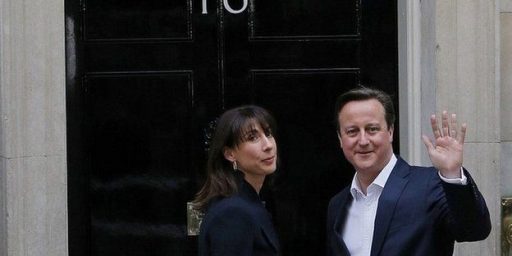
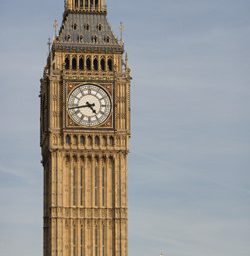
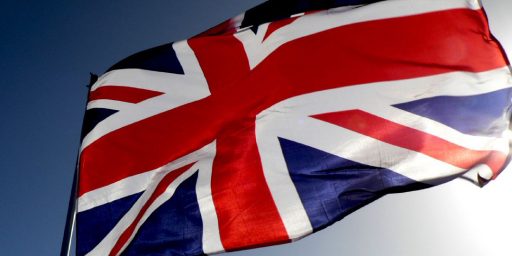

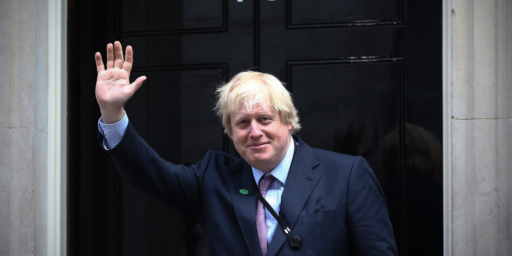
I wonder how many conservatives on this side of the pond would admit what Cameron apparently already knows–that there isn’t enough of the hard right, either in the UK or here, to form a majority government on the national level…without moderates and independents, Republicans will never be able to build a coalition big enough to take power, but hey, they are certainly welcome to keep talking of RINOs and purges and conservative purity…all that is great grist for the mill while they remain in the minority…
Doug – you seem to be naively relying upon the Biased Broadcasting Corporation (BBC) as your source of information as to feelings and attitudes in the UK …
Worse yet, you then quote The Grauniad, the very epitome of not just bad/biased information and close-to-non-existent fact-checking, yet also the poster-child for abysmal editing, never mind spell-checking … there is a reason that well-informed folk have thought of the Grauniad as the Grauniad for the past many decades … (it’s actually the Guardian, known as the Grauniad in homage to its well-earned reputation for accuracy) …
We will see, over the next days and weeks and months just what kind of Prime Minister David Cameroun turns out to be …
The biggest indicator, most likely, will be the first few pieces of legislation passed into law with him as Prime Minister …
Thatcher drove away the milder conservatives? Seriously? In all three elections where she was leader, she handily beat Cameron’s share of the vote. Only a few months ago the Tories were polling in the same range. Cameron’s backbenchers are furious because he managed to blow a double digit lead.
From what I saw in the most recent elections it’s the Democrats who are suffering from an identity crisis while solid conservatives are riding a groundswell of support and optimism.
The far left policy agenda of the current president is harming Dems while helping Republicans. Since we don’t have a three party or parliamentary system I don’t see any real comparison to Great Britain. If Cameron is taken down it will be by the opposition, not his own party.
Not so fast, Doug. With some organizational tactical and strategic leadership (are you listening Carl Rove?), the Republican Party can be a converted into a coalition of the traditional free enterprise, small business, strong national defense, pro-military and pro-veteran Republicans and the Tea Party movement, which now cuts across party lines. I predict the latter group gets stronger as the Obama Administration tries to get all of its lefty wet dream programs and policies enacted.
If RINO’s want to join that coalition, it will be unlikely that they will run the party so they will be welcome; true mossbacks will be marginalized.
What’s wrong with that scenario? ISTM, a Thatcher/Cameron-like individual could pull this all together with a carefully crafted, coherent philosophy of government.